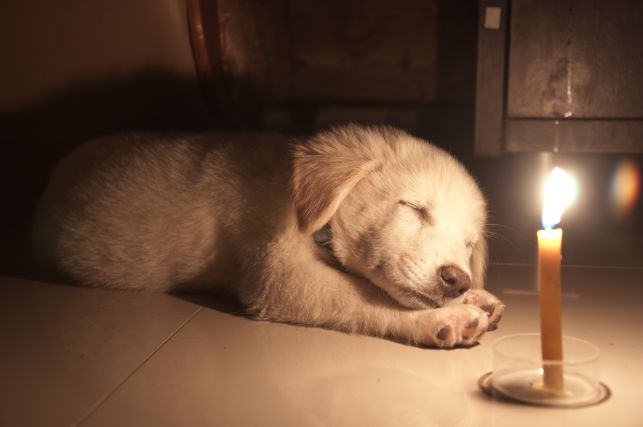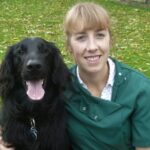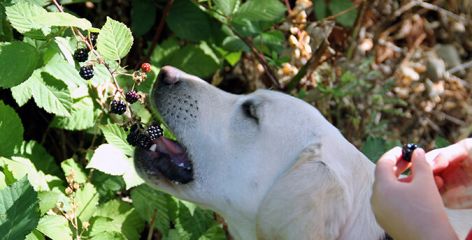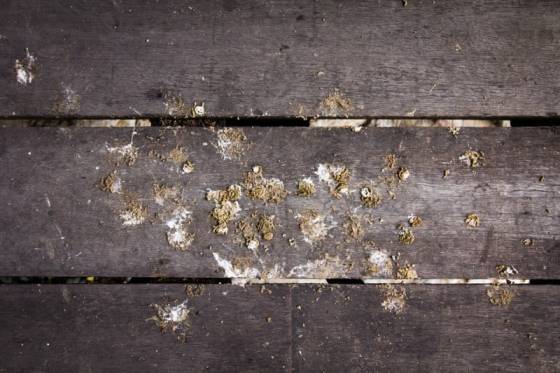Dogs will eat the strangest things, with some dogs even eating wax! Why on earth would a dog choose to eat wax?
Connect with a verified veterinarian in minutes. Licensed vets are available 24/7 to answer your questions. No need to worry about your furry family member.
If you have scented candles at home, their smell may be attractive to your dog and he may even believe it’s a treat of some kind. Dogs explore the world through their mouths and are scavengers by nature, which means they might just try a bite or two!

Is Wax Poisonous?
Should you worry if your dog ate some wax? It depends. While the wax itself is considered to be non-toxic, those scents that make the candle or wax smell good could be toxic. These substances in wax can be poisonous:
- Essential oils
- Perfumes
The good news is that most wax contains low amounts of these substances and may not cause a problem if eaten. However, if a dog eats a large amount, then he could experience symptoms of toxicity.
These include:
- Vomiting
- Diarrhea
- Drooling
- Lethargy
- Lack of appetite
While wax on its own probably isn’t poisonous, it could cause other medical problems, including an intestinal blockage. This is a serious, life-threatening emergency.
However, if the wax your dog has eaten is beeswax, paraffin, or soy, chances are the wax will soften in your fur baby’s system and pass on through without any trouble.
We can’t forget to mention that the candle wick can also be dangerous if your dog eats it. The wick is usually made of braided cotton. The wick’s end may be caught in a metal “anchor” that holds the wick in place as the candle burns.
The problem with the wick is that if it’s long and your canine companion eats it, the string can become tangled in the dog’s intestines. This is a dangerous condition. In this case, the vet usually has to perform surgery to remove the wick and the metal anchor.
My Dog Ate Wax – What to Do
First, if your canine companion happened to eat a candle, then check the bottom of the candle or the package it came in (if you still have it) to see if any ingredients are listed. Look for the type of wax and/or the scent it contained (was it an essential oil, for instance). This information can help the vet determine treatment options.
Next, check to see how your fur baby is behaving. Is he having difficulty breathing? Does he seem stressed in any way? Is he salivating excessively? Note down any symptoms you notice. The vet will need this information to determine the best next steps to help your dog.
Now, you can determine if your dog has eaten the candle and wick. Is the candle in pieces? How much of the candle did your dog eat? If the wick is missing, there’s a good chance your fur baby has ingested it. If so, call the vet immediately.
Do not try to induce vomiting, unless directed to do so by your vet.
If your pup only ate a little bit of the wax, the vet may ask you to monitor them for any signs and symptoms mentioned above. If your fur baby happened to eat a large amount of wax, the vet will ask you to watch for signs of a bowel blockage, which includes vomiting, diarrhea or constipation, abdominal pain, and reduced appetite. They may also advise you to give your dog some plain canned pumpkin (not pumpkin pie filling) to help move the wax through your dog’s system. You’ll need to watch your fur baby—if he’s constipated for one or two days, then be sure to call the vet.
And of course, watch for signs of a bowel obstruction. If you see symptoms of this condition, or you’re worried about other signs, then be sure to call your vet for guidance. Chances are your dog will be good just after eating wax but do monitor him for a couple of days to make sure he’s OK.

Review symptoms, medications & behavior to keep your pets healthy with a Vet Online in just minutes.
Ask a Vet Live NowPrevent Your Dog from Eating Candles
If your fur baby has a penchant for eating things around the house, it’s best to keep all candles (and other items) out of his reach. Be sure to keep candles up high where your dog can’t reach. Store candles in a closed cabinet or closet.
Does your dog seem to eat candles while you’re out of the house? In that case, you may want to consider keeping him in a crate while you’re away. If that’s not possible, then consider one of the rooms in your home that is safe. It’s best to remove all items your dog may be tempted to eat.
You may also want to train your dog the “leave it” or “drop it” command. Any time he has something in his mouth he shouldn’t have, give him the command. Then you get these items away from your dog before he tries to ingest them!
Connect with a verified veterinarian in minutes. Licensed vets are available 24/7 to answer your questions. No need to worry about your furry family member.

Rebecca MacMillan, BVetMed BSAVA PGCertSAM MRCVS
This article has been reviewed and approved by an independent Veterinarian: Rebecca is a companion animal vet who has always had a passion for writing and client communication. Since her graduation from the Royal Veterinary college in 2009 she has gained a wealth of experience in first opinion small animal practice, in both clinical and managerial roles. She currently works in the South West and deals with a variety of routine and emergency appointments, but particularly enjoys medicine cases. Outside of work and writing, she enjoys spending time with her family, including her bouncy flat coated retriever George!
Review symptoms, medications & behavior to keep your pets healthy with a Vet Online in just minutes.
Ask a Vet Live Now





